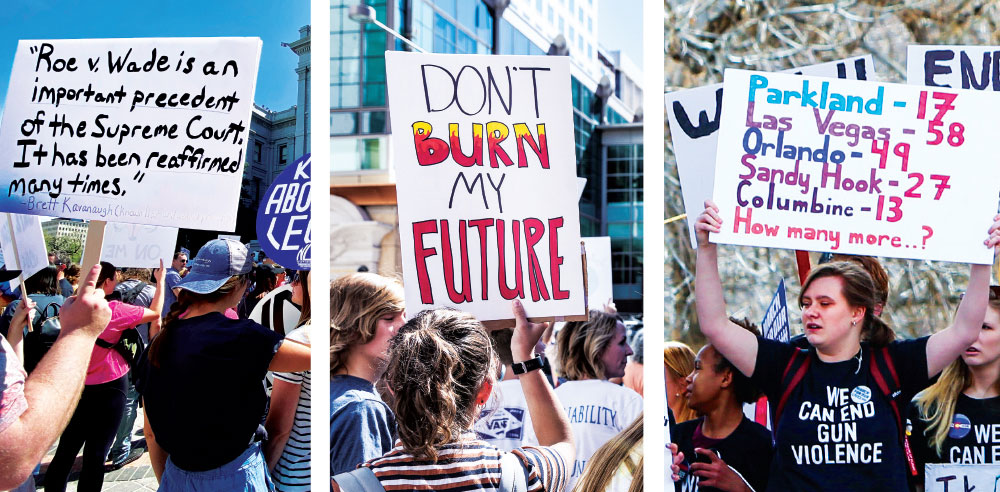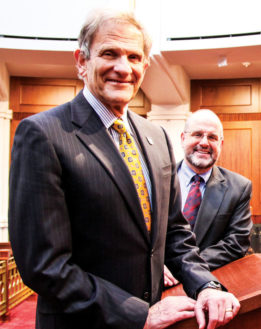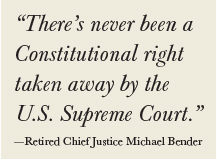
Even before the recent Supreme Court decisions, Denverites were out expressing their concerns about a woman’s right to choose, climate change, and gun reform. Pictured above are a May 2022 rally for choice, a September 2019 youth-driven climate strike, and a student walk out in March 2018 to protest gun violence. Photos: (left) Christie Gosch, (middle) Jamie Kraus, (right) Steve Larson
In the final days of its term, the Republican appointed justices on the Supreme Court issued decisions that go to the very heart of some of the most contentious issues in American society today: climate change, guns and abortion.
At a time when climate change is associated with extensive droughts, extreme weather, and wildfires, the Court limited the EPA’s ability to regulate carbon emissions from power plants. While mass shootings continue and gun violence is rising, the Bruen ruling made it more difficult for states and municipalities to implement effective gun control policies. And for the first time in U.S. history, the Supreme Court took away an existing right, the right for women to exercise control over their own bodies.

Chief Justice Michael Bender (left) with Appellate Judge Steve Bernard in 2013 at the unveiling of the new Ralph L. Carr Justice Building in downtown Denver. File photo by Steve Larson
For a legal perspective on recent rulings, Front Porch turned to a Northeast Denver neighbor who served at the top of the state’s judicial system. Justice Michael Bender was appointed to the Colorado Supreme Court in 1997 and served as Chief Justice from 2010 to 2014.
Bender is concerned about the originalist view of the Constitution that’s driving these decisions, arguing that even the Founding Fathers wouldn’t subscribe to such rigidity. “Originalism is the idea that the actual words of the Constitution are all that matters. Thomas Jefferson said that you have to interpret and construe the Constitution with the times, so that throws a big monkey wrench in the idea of textualism and originalism.”
In the Dobbs abortion case, he believes the Court ignored legal precedent and dismissed human rights. “There’s never been a Constitutional right taken away by the U.S. Supreme Court. So we have a Supreme Court that does not protect individual rights such as the rights of women, and we have [Justice Clarence] Thomas saying we shouldn’t have the right of privacy, even though it forms the basis of various other rights.”
The EPA ruling puts authority for climate change efforts in the wrong place, says Bender, since it requires Congress to devise regulations that govern emissions. “The idea that we can’t have administrative agencies to protect everybody in terms of public safety is destructive. And then to expect a legislature or Congress to have expertise in the area of complex problems that we face today with climate change and public safety is irrational.”
 And he cites other cases that concern him, such as the recent ruling involving the Washington state coach that narrows the separation between church and state. He’s also concerned about cases that will be heard in the upcoming term: affirmative action at Harvard and gerrymandering of state legislatures that draw congressional and state districts in violation of civil rights. He doesn’t mince words. “They are using theories that are historically inaccurate and internally inconsistent to reach results that are entirely political.”
And he cites other cases that concern him, such as the recent ruling involving the Washington state coach that narrows the separation between church and state. He’s also concerned about cases that will be heard in the upcoming term: affirmative action at Harvard and gerrymandering of state legislatures that draw congressional and state districts in violation of civil rights. He doesn’t mince words. “They are using theories that are historically inaccurate and internally inconsistent to reach results that are entirely political.”
Bender also takes issue with the long-held view of Chief Justice John Roberts that “the job of a judge is to call balls and strikes.” Bender says that “is accurate for a trial judge who is judging facts or determining what kind of evidence a jury ought to hear.” But that statement “is totally false when considering the role of the U.S. Supreme Court, which every year considers cutting-edge theories for which there is no precedent—and where we have diametrically opposed or complex issues dealing with all kinds of rights that conflict with each other.”


The singular United States Supreme Court message with the abortion and EPA decisions is to state and national government . . . . .
REPRESENTATIVE GOVERNMENT: DO. YOUR. JOB.
It is no longer acceptable for Congress to assign the tough and thorny environmental issues to an unelected, unaccountable, and faceless EPA bureaucracy. Environmental policy must be set by congress with all the accompanying transparency, responsibility and accountability. Having the EPA set these standards is like asking the IRS to set the tax rates.
Abortion has gotten so involved and complicated with such things as gestational age for terminating, notice minor of procedures on children, licensing requirements for abortion practitioners, details of informed consent, and more, that it is singularly inappropriate to address these important matters in a courtroom instead of legislative chambers. No longer can a legislature hide behind a vague and illusive constitional issue while avoiding some of the most important and vital issues of the day.
Justice Bender is exactly right with his observation about unprecedented, complex, and cutting edge issues. The increasing importance of these issues makes reliance on the democratic process of representative government even more vital. The judicial department of government must be free to interpret and apply laws which are the product of representative government, not substitute its judgement for respresentative government.